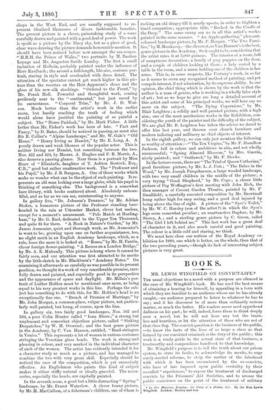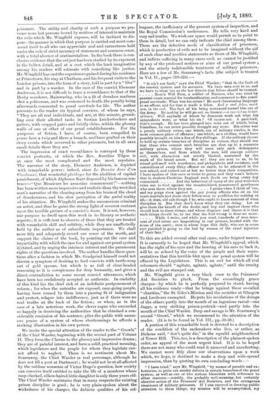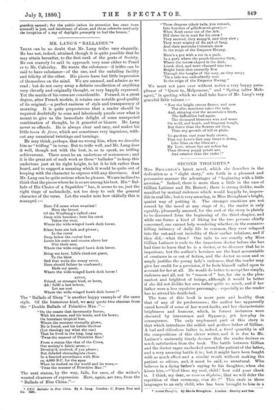BOOKS
MR. LEWIS WINGFIELD ON CONVICT-LIFE.* Tax usual objections to a novel with a purpose are silenced in the case of Mr. Wingfield's book. He has used the best means of obtaining a hearing for himself, by appealing in a form with which they are familiar to an audience whose ear he has already caught,—an audience prepared to listen to whatever he has to say ; and if his discourse be of more than ordinarily serious matter, so much the better. Ma readers never need apprehend dullness on his part ; he will, indeed, force them to think deeply over a novel, but he will not bore any but the brain- less and heartless, or let the attention of those who are not of that class flag. The convict question is the business of the public, —to know the facts of the lives of so large a class as that formed by our convicted criminals is the duty of the public ; this work is a ready guide to the actual state of that business, a trustworthy and compendious handbook to that knowledge.
Mr. Wingfield's purpose is to tell the truth about our prison system, to state its faults, to acknowledge its merits, to urge sorely-needed reforms, to strip the matter of the falsehood with which it has been encumbered by the ex-convicts, who have of late imposed upon public credulity by their so-called "experiences," to expose the treatment of discharged convicts by the Prisoners' Aid Societies, and to arouse the public conscience on the point of the treatment of military
• In Her ifttiesies Keeping: the Story of a Hidden Life. By the lion. Lewis Wingdeld. London : Bentley and Son.
prisoners. The utility and charity of such a purpose we pre- sume none but persons bound by motives of interest to maintain the evils which Mr. Wingfield exposes, will be inclined to dis- pute: the manner in which that purpose is carried out must com- mend itself to all who can appreciate zeal and earnestness held under the rule of strict accuracy of statement and common-sense, with a total absence of sentimentalism. In the book there is con- clusive evidence that the subject has been studied by its exponent in the fullest detail, and at a cost which the least imaginative among his readers will estimate with something like justice. Mr. Wingfield has cast the experiences gained during his residence at Princetown, his stay at Chatham, and his frequent visits to the London prisons, into the form of a story, told in part by a "lifer" and in part by a warder. In the case of the convict Ebenezer Anderson, it is not difficult to trace a resemblance to that of the Derby murderer, Mainwaring, who in a fit of drunken madness shot a policeman, and was sentenced to death, the penalty being afterwards commuted to penal servitude for life. The author presents to the reader six typical convicts, of whom he says, "They are all real individuals, and are, at this minute, grumb- ling over their allotted tasks in fustian knickerbockers and gaiters, with cropped pates and bristly chins, within the gloomy walls of one or other of our penal establishments. For the purposes of fiction, I have, of course, been compelled to prune here a twig and there a branch, and have grafted on their story events which occurred to other prisoners, but in all save small details there they are."
The impression of exact resemblance is conveyed by these convict portraits, of which the Rev. Aurelius Tilgoe is at once the most complicated and the most repulsive. The narrator of the story, Ebenezer Anderson, is depicted with remarkable power; indeed, since Le Dernier ,Tour d'un Vondatnne, that wonderful plaitloyer for the abolition of capital punishment, of which Alphonse Karr disposed by his famous sen- tence—" Que Messieurs les assassins commencent !"—nothing has been written more impressive and realistic than the wretched man's narrative of the clearing-away from his brain of the cloud of drunkenness, and his slow perception of the awful reality of his situation. Mr. Wingfield makes the unconscious criminal an artist, and thus he gains the strong light of severest contrast upon the terrible picture of a convict's doom. It is not, however, our purpose to dwell upon this work in its literary or lesthetic aspects ; it is suffizient to observe of those that they are treated with remarkable skill and subtlety, while they are unaffectedly held by the author as of subordinate importance. We shall more fitly and adequately record our sense of the worth, and support the claims of the book, by pointing out the care and impartiality with which the case for and against our penal system is:stated, and by urging the intrinsic interest and the paramount rights of the questions involved. The author handles these ques- tions after a fashion in which Mr. Gradgrind himself could not discern a symptom of desiring to feed convicts with turtle-soup out of gold spoons, but which is as full of clear-headed reasoning as it is conspicuous for deep humanity, and gives a direct contradiction to some recent convict utterances, which have been too credulously accepted as authentic. In credulity of this kind lies the chief risk of an indefinite postponement of reform ; for when the untruths are exposed, easy-going people, having been roused by them into a passing fit of indignation and protest, relapse into indifference, just as if there were no real truths at the back of the fiction ; or when, as in the case of a late notorious work, the clever rogue who succeeded so happily in deceiving the authorities that he obtained a con- siderable remission of his sentence, plies the public with nause- ous praise of a system of whose shortcomings he affords a striking illustration in his own person.
We invite the special attention of the reader to the "Growls" of the Chief Warder, beginning with the second part of Volume II. They form the Chorus to the gloomy and impressive drama ; they are of painful interest, and have a solid, practical meaning, which legislators and the people for whom they legislate can- not afford to neglect. There is no sentiment about Mr. Scarraweg, the Chief Warder (a real personage, although he does not fill a post at Dartmoor) ; he would not be at all affected by the sublime nonsense of Victor Hugo's question, how society can conceive itself entitled to take the life of a murderer whose rosy-cheeked, silken-haired little daughter is only three years old. The Chief Warder maintains that in many respects the existing prison discipline is good ; he is very plain-spoken about the wickedness of his charges, the dubious qualities of his col-
leagues, the inefficiency of the present system of inspection, and the Royal Commission's uselessness. He tells very hard and very sad truths. We wish our space would permit us to point to them in detail, but we can only indicate the chief among them. These are the defective mode of classification of prisoners, which is productive of evils not to be imagined without the aid of such clear and positive statements as those of Mr. Wingfield,, and inflicts suffering in many cases such as cannot be justified by any of the professed motives or aims of our penal system ; and the utterly indefensible treatment of military prisoners. Here are a few of Mr. Scarraweg's facts (the subject is treated in Vol. II., pages 319-324) :—
" It ain't our fault," says the Chief Warder ; "that is, the fault of. the convict system and its servants. We have men sent to us, and we have to treat 'em as the law directs that felons should be treated.
Here's Will Fern, a soldier of Marines, who was tried by general court-martial for insubordination, and sentenced to five years' penal servitude. What was his crime ? He used threatening language to an officer, and for that is made a felon. And a real felon, mark you' in the end. The fact of his being sentenced turned him out of the Army. By-and-by he will go out on licence,—a convict on ticket- of-leave. Will anybody of whom he demands work ask what his antecedents were, or what his sin ? Of course not. A gaol-bird, that's enough. He has been plunged into mire out of which, being friendless, he can never possibly struggle any more. His crime was a purely military crime, one which, out of military circles, is the most common-place of offences; one which, as a civilian, would have possibly brought on him a fine of five shillings. If the military choose to hold up certain breaches of discipline as crimes, they should see that those who commit such breaches are shut up in a separate military prison, where they will meet only such delinquents as themselves' and from which the men will emerge soldiers still, with characters not utterly blasted, unstained by the mark of the broad arrow. But no! they are sent to us, to be mixed pell-znell with murderers, and pickpockets, and ravishers, and committers of every filthy offence on earth, to be educated in the new school, and turned out at last no better than their companions. I have spoken of this once or twice to gents, and they won't believe that in modern Christian Englund such deeds are being every day
committed And the behaviour of many of the poor wretches cries out to God against the moustachioed, pomatumed gentlemen
who sent them where they are I groan when I think of 'em, and my gorge rises against the gay young officers who sit on the conrt-martials and doom their fellow-men to perdition for nothing at all,—it does, old salt though I be, who ought to know summat of what discipline is. But they don't know what they are doing. Let us give them the benefit of the doubt, and beg and implore those who should look to these things, and whose disgrace and shame it is that such things should be, to see that the foul wrong is done no more.
While I write, and while you read, hundreds of men inno- cent of civil crime are languishing in our prisons, herded with the- scum of the earth ; men in whom hope dies daily, who are in some sort justified in going to the bad by reason of the cruel injustice of their fate."
To this are added several other real cases, under feigned names.. It is earnestly to be hoped that Mr. Wingfield's appeal, which has the sight of his eyes and the hearing of his ears to back it, will be so echoed by the voice of the people and their repre- sentatives that this terrible blot upon our penal system will be effaced by the Legislature. This is an end for which all real reformers should "agitate, agitate, agitate," until the cruelty and the evil are stamped out.
Mr. Wingfield gives a very black crow to the Prisoners! Aid Societies to pluck. From the exceedingly grave charges—by which he is perfectly prepared to stand, having all his evidence ready—that he brings against these so-called "charities," the St. Giles's Mission and the societies at Glasgow and Leeds are exempted. He puts his revelations of the doings of the others partly into the mouth of an ingenious rascal—one Jaggs, a very striking prison-portrait—and partly into the mouth of the Chief Warder. Deep and savage is Mr. Scarraweg's second "Growl," which we recommend to the attention of the reader. (It is to be found in Vol. III., pp. 30-38.) A portion of this remarkable book is devoted to a description of the condition of the sack makers who live, or rather, as. Dickens said, "don't quite die," in the squalid neighbourhood of Tower Hill. This, too, is a description of the plainest-spoken order, an appeal of the most urgent kind. It is to be hoped: there are not many who could read it unmoved and unreflecting. We cannot more fitly close our observations upon a work which, we hope, is destined to make a deep and wide-spread impression, than by quoting its own concluding words :— "I have tried," says Mr. Wingfield, "by means of parable and ex- hortation, to point out sundry defects in certain branches of the penal system, as well as one or two serious blemishes with reference to other matters,—notably, the probably well-meaning, but certainly abortive action of the Prisoners' Aid Societies, and the outrageous treatment of military prisoners. If I can succeed in drawing public attention to these things, my mission will be aceemplished, my
pardon earned ; for the public (when its attention has once been aroused) is just, and intolerant of abuse, and these cobwebs need only de irruption of a ray of daylight promptly to feel the broom."




































 Previous page
Previous page